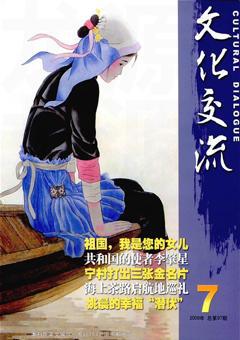Dancing Master’s Career and Year 2008
By Shen Zhirong


Cui Wei, president of the Hangzhou Dancers Association, witnessed her career blossom in 2008, not as a dancer, but as a choreographer for the celebrating ceremonies of the Beijing 2008 Olympic Games.
Cui Wei was chosen to choreograph for the countrys biggest gala because of her eye-catching dancing masterpieces over recent years in Hangzhou. She entered Beijing Dance Academy at the age of 12. Upon graduating from the academy at the age of 18, she came to Hangzhou. Her first creation for the city was an adaptation of the 1995 pop sensation “Sister Drum” to a dancing poem. To submerge herself in Tibetan ethos, she paid four visits to Tibet. She almost died in one of the visits when she had a fever and urgently needed to see a doctor. The jeep ran wildly across the vast wilderness in order to reach the nearest clinic in time and her friend in the jeep tried to give her an intravenous injection. The needle failed to get in on a few trials and Cui had to drink the liquid. Fortunately she survived. What she witnessed in Tibet bloomed in her first masterpiece.
The dance drama in 1997 was a colossal success and grabbed seven national top honors. It was also staged overseas. And it got continuously polished in the following years. It was included in a national list of the best dances for the year from 2006 to 2007, firmly establishing Cui Wei as one of Chinas best choreographers.
Calling for Beijing galas came in February, 2007. Thanks to the support of the citys cultural authorities, she rushed to Beijing despite her own tight work schedule for some big occasions, thus started her 600-plus-day work for the 2008 Beijing Olympic Games.
The first thing she did was to sign a contract. She was required to keep her work top secret. The contract said that divulging the state secrets was punishable for seven years in prison. Even her mother did not know what she was doing exactly. Security played a big part in her everyday work in Beijing. She needed to swipe her identification card at three checkpoints before she got to her office.
Security, however, was no challenge at all. For Cui Wei and her team for the Paralympics Games, the biggest challenge was to find truly and convincingly great, original and authentic ideas for performances.Every detail was to embody the spirit of “Transcendence, Integration and Equality” of the Paralympics and highlight the “One Dream, One World” idea which the Beijing Olympic Games promoted. Sometimes all the directors sat together for breakthrough ideas and no one spoke for half a day and failed to come up with one single useable idea. The team had this record: an original idea was modified more than 100 times before it was finalized. The team would go wild with bliss when it hit upon a great idea. A few days later the idea would seem not so great. Then the team would begin another painstaking search for a new inspiration. Cui Wei observed in a post-Olympic interview: “The creative ideas I produced during the 600-day work could have produced 100 performances. But we had to keep thinking before we agreed we got the truly great concept. We had a great variety of materials but the team needed to minimize and pick the very best.”
As there were altogether two opening and two closing celebrations for the Olympics and Paralympics, the last one, the closing ceremony of the Paralympics, was supposed to bring the whole show to a big, successful end. Yet, there was to be no repetition. Even performers for one gala show did not take part in any other shows.
Cui Wei was extremely busy, just like anyone else on her team. In the first few months, she shuttled between Beijing and Hangzhou to get the shows in Hangzhou done while making preparations for the work in the capital. After all the shows in Hangzhou were completed, she put her heart and soul into the work in Beijing. One typical day would witness her spending the morning in Daxing, a suburb of Beijing and traveling to Tianjin in the afternoon and then came back to the Birds Nest at night. She worked 16 hours a day. The only break she and her colleagues enjoyed was lunch time when they could chat, joke, and laugh.
It goes without saying the final show in which she played a big part was a huge success. After the Olympics and Paralympics, Zhang Yimou and his seven associate directors including Cui Wei were honored for their contribution and achievement by the CPC central committee and the State Council. Back in Hangzhou, she was honored by the city government.
Some of her friends wondered why she, the only director who came from outside Beijing and worked for the Olympics and Paralympics, did not choose to stay in Beijing and find a new job in the capital where she could have greater opportunities for her future career.
She has chosen to stay in Hangzhou. She would benefit from her experience in Beijing, but she would like to make use of the valuable experience to do something for Hangzhou, her new hometown.
At present, Cui is looking at ideas for a show that can be staged repeatedly at a fixed venue in Hangzhou for a long time. She says that Hangzhou gives her opportunities to achieve her dreams. The city is more than a comfortable place to live; it is also a place to go ahead with ones career. □

